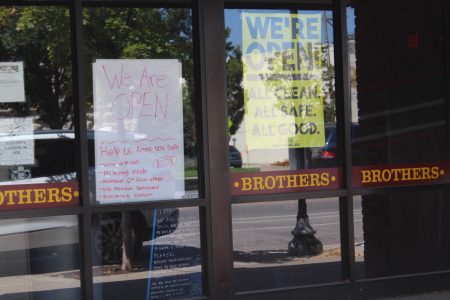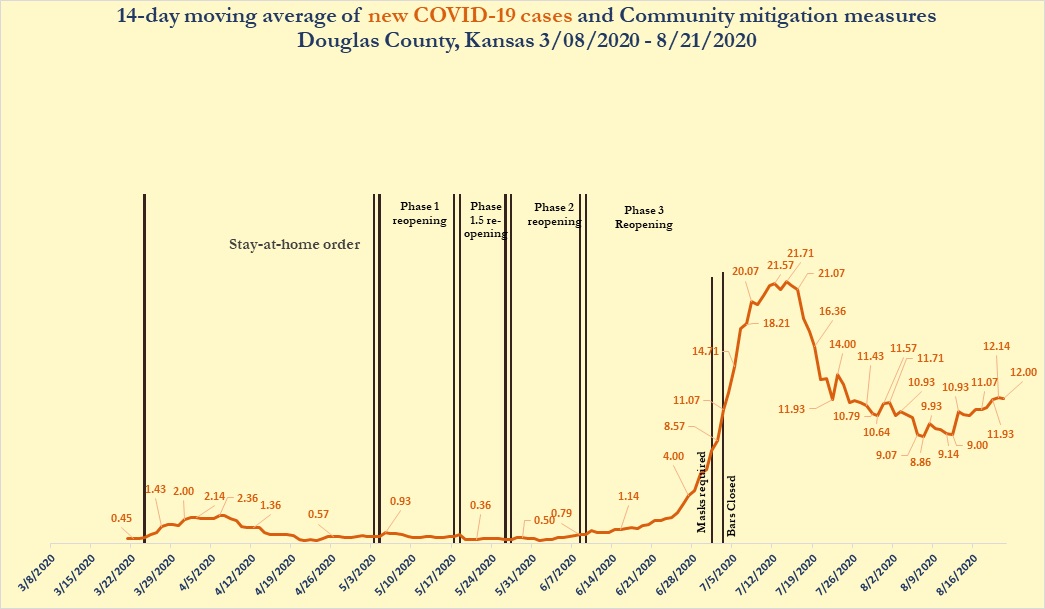Are bars open legally in Douglas County? Health department is still determining the specifics

photo by: Journal-World photo
Brothers Bar & Grill in downtown Lawrence has been open for weeks, despite a ban on bars operating during the pandemic. Questions about how much food an establishment must serve in order to qualify as a restaurant, rather than a bar, are mounting as students return to the community.
It’s been more than a month and a half since the health department issued a pandemic-related order requiring bars to close in Douglas County. But the health department is still determining what exactly that means.
In the first week of July, Douglas County’s public health officer ordered all bars closed in an attempt to mitigate the spread of COVID-19. Yet, while the order is still in place today, some bars in Lawrence remain open — some with the addition of food services — leading to the question: Is the order not being enforced, or have these establishments been deemed restaurants?
Dan Partridge, director of Lawrence-Douglas County Public Health, said that after the bar closure was ordered in early July, certain establishments that considered themselves bars reached out to the health department to see if there was a way they could reopen.
“We developed a process to answer that question; however, as we’ve been working through the process, it has become more difficult to apply it in a consistent way,” Partridge said in an email to the Journal-World. “Now we are working to find a better process to consistently enforce the bar-closure order across Douglas County.”
On Wednesday morning, the Journal-World asked Lawrence-Douglas County Public Health about an FAQ on its website that reads, “What is required for an establishment to function as a restaurant?”
That morning, the website stated that for an establishment to be considered a restaurant, no one may be seated at the bar, there cannot be a dance floor and there cannot be other functions that don’t allow for proper social distancing between parties.
The website also stated that for an establishment to operate as a restaurant it must have a food service license from the Kansas Department of Agriculture and less than 45% of its sales must come from alcohol, according to its most recent filing.
But by Wednesday afternoon, the FAQ had been updated. It now states that the health department has worked with the City of Lawrence to “identify establishments who have more than 45% of their sales from alcohol. These establishments are determined to be bars and not eligible to operate as a restaurant, given the restrictions of the current local health order.”
The FAQ does not state that the health department, which serves all of Douglas County, has also worked to identify bars outside of Lawrence.
When asked which establishments in Lawrence have been identified as bars by the health department and the City of Lawrence, the health department backtracked, stating that the City of Lawrence could provide the list, but that it is not accurate.
“(We) have learned there was a misunderstanding about the criteria as it applies in this context. That list is not the correct list to determine which establishments would meet the definition of a restaurant based on less than 45% of their sales coming from alcohol,” Partridge said.
Porter Arneill, communications director for the City of Lawrence, said the list to which the health department was referring is from 2018 and was used by the city manager during a recent meeting “as an example of how the City applies these definitions.” It was not meant to be a definitive list for the context of determining which establishments would meet the definition of a restaurant based on less than 45% of their sales coming from alcohol, he said.

photo by: Journal-World photo
A Budweiser sun shade goes unused in front of Louise’s bar in downtown Lawrence on Friday afternoon. As classes at KU begin next week, health department leaders were still working to explain how an ban on bar operations will be defined in the Lawrence and Douglas County.
Health department has received 22 complaints about bars
Phil Bradley, executive director and lobbyist for the Kansas Licensed Beverage Association, said the bar industry has not been consulted in discussions surrounding the health department’s definition of a bar or ways in which bars may function as restaurants. He also wonders whether the health department is doing anything to enforce its order.
“If I’m a business and I’m trying to follow everything and I get a notice from my employee that they’ve gone to work … across town … why should I comply with the law if they’re letting other people get away with it?” he asked.
George Diepenbrock, spokesperson for Lawrence-Douglas County Public Health, said the health department did have a meeting where bar owners and distributors were present and during which the definition of a restaurant was stated. That meeting occurred prior to June 8, when bars could open initially after the shutdown.
Partridge told the Journal-World that since the bar closure order, the health department has received 22 complaints alleging bars are operating when they should be closed. Diepenbrock said that all 22 complaints have been investigated, and that similarly to the mask order, it takes three separate complaints of the same business for the health department to refer the complaint to law enforcement.
Dorothy Kliem, a trial assistant with the district attorney’s office, said the health department has referred two complaints to the DA’s office for businesses in violation of the health order. She said that no court actions for potential violations have been initiated by the DA’s office, but that notice has been issued to both establishments requesting voluntary compliance.
Kliem said a notice requesting voluntary compliance has been served for D-dub’s, a sports bar in Eudora. The district attorney’s office is also in the process of serving a notice to The Outhouse, located in rural Lawrence.
Kansas law states that an intentional violation of a local health order carries a civil penalty of up to $2,500.
“State law also authorizes the district attorney’s office to enjoin or obtain a restraining order against anyone ‘who has violated, is violating or is otherwise likely to violate’ such an order,” Kliem wrote in an email to the Journal-World.
Bar lobbyist calls for regulated behaviors, not industries
In addition to saying the health department should have done a better job of communicating and enforcing its rules, Bradley also believes regulations should be placed on behaviors, not industries. He said many of his members in the Kansas Licensed Beverage Association have not made a profit since March.
“You can be dangerous in any class of business,” Bradley said. “This seems to be very capricious and arbitrary … it seems they don’t want to do (the) actual work of enforcement.”
Bradley said he wants regulations in place for the safety of residents, but that he just wants them to be uniform across industries. If regulations aren’t met, Bradley expects them to be enforced and for penalties to occur.
Specifically, Bradley said he thinks regulations prohibiting people from sitting at a bar or banning establishments from having a dance floor, like those that were on the health department’s website, are fine. He wants bars to have the opportunity to follow those guidelines while being allowed to open.
Bradley questioned how the city or health department would know what percentage of a business’ sales come from alcohol.
When asked how the city would determine this, Arneill said that use determination for an establishment is made when an applicant submits a site plan for a project.
“As part of City zoning, Planning and Development Services uses that section to help determine if an establishment meets the particular use definition and should be classified as a Bar or Lounge use versus being classified as an Eating & Drinking Establishment use,” he said. “Depending on where an establishment is in the city, there may also be other considerations.”
It is unclear how this answer responds to the question of how the city would determine the percentage of a business’ sales that come from alcohol. It is also unclear how the health department would know what percentage of a business’ sales throughout Douglas County come from alcohol. The state does collect drink tax revenues from bars, restaurants and other establishments that sell liquor by the drink. At what points the city has access to the individual drink tax numbers for each business, though, is unclear.
Bradley also said that any recent data used to determine the percentage of sales from food vs. alcohol would be warped because of the changing rules throughout the pandemic. And for bars serving customers outside, Bradley wondered how that would be different from a restaurant providing similar outdoor services. (The health order issued in early July does not provide an exemption to the rule of bars being closed if they only have outdoor seating.)
Bradley also questioned whether the decline in the number of new cases of COVID-19 in Douglas County in mid-July could “convincingly” be attributed to the closing of bars in early July.
Partridge pointed to the health department’s graph depicting Douglas County COVID-19 cases, which notes when bars were ordered to close. That 14-day moving graph shows the number of cases in the county beginning to decline about 14 days after the order was put in place. The date the mask ordinance was put into place is also marked on the graph on July 1.

photo by: Lawrence-Douglas County Public Health
Aug. 21 COVID-19 update from the health department
Partridge said it is important to remember the incubation period of the virus is 14 days.
“In the spike in cases we experienced in late June and early July, Lawrence-Douglas County Public Health staff interviewed positive cases and identified 108 cases tied to bar environments in Lawrence from the time bars were allowed to reopen through their closure on July 3,” he wrote in an email to the Journal-World. “We instituted the public health orders in early July that required masks in certain environments and closed bars. As reflected in the graph roughly two weeks later, we believe there is strong correlation in the effectiveness of these orders and the reduction of the level of disease transmission we have seen in the community.”







